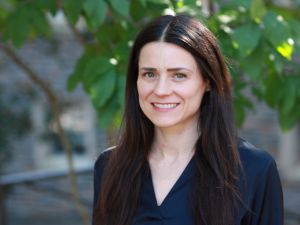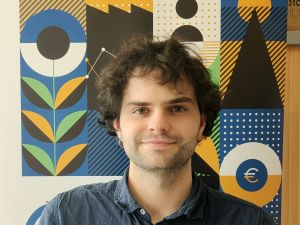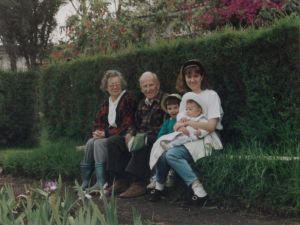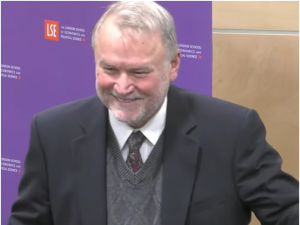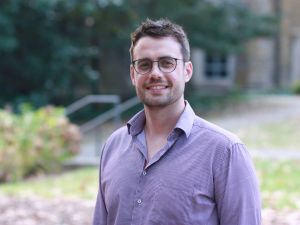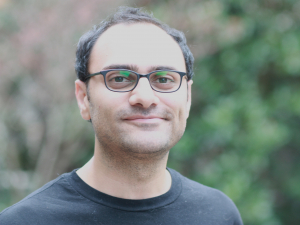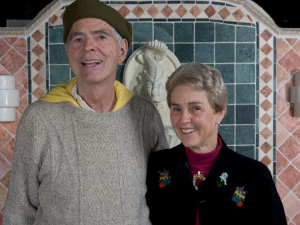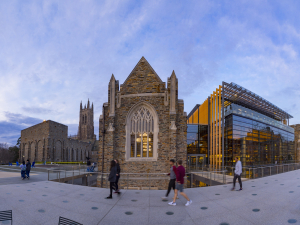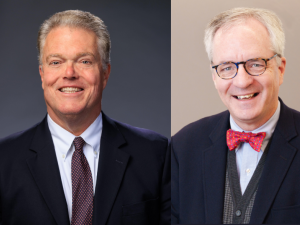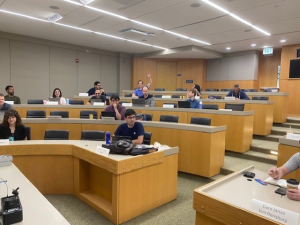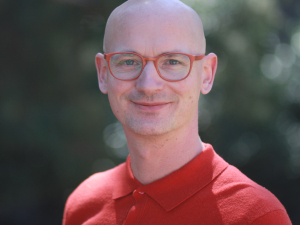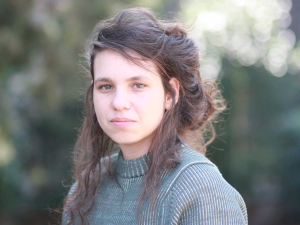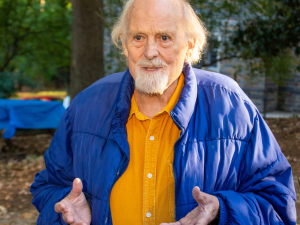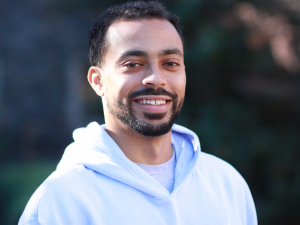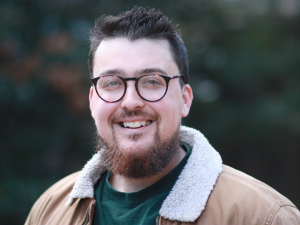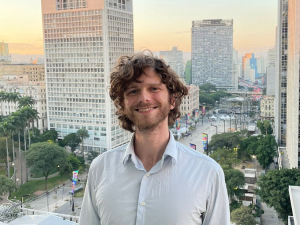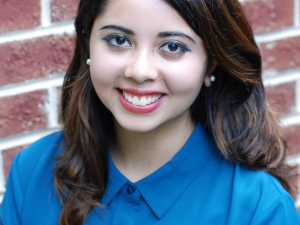We are thrilled to share that Hannah Glasson, 2024–2025 HOPE Scholar, has accepted a position as Visiting Assistant Professor of Environmental Policy and Culture at Northwestern University.We are excited to see her take this next step in her career and know she will bring the same scholarship and thoughtfulness to her teaching and research at Northwestern.Please join us in congratulating Hannah on this wonderful achievement! read more about Hannah Glasson Joins Faculty at Northwestern University »
We’re thrilled to announce that Julien Gradoz, 2024–2025 HOPE Visiting Scholar, has been appointed Assistant Professor of Economics and will be joining the law faculty at Jean Moulin Lyon 3 University.During his time at the HOPE Center, Julien was a prolific scholar, submitting ten working papers to the HOPE Working Paper Series.A well-deserved congratulations to Julien! read more about Julien Gradoz Joins Faculty at Jean Moulin Lyon 3 University »
We are pleased to share that Vincent Carret, 2021–2023 HOPE Visiting Scholar, to join the economics faculty at the Stillman School of Business at Seton Hall University. Vincent will be teaching courses in the history of economic thought, economic history, and macroeconomics. Congratulations, Vincent! read more about Vincent Carret, 2021–2023 HOPE Visiting Scholar Joins Faculty at Seton Hall University »
We are thrilled to share that HOPE 2023–2024 Visiting Scholar, Joshua Banerjee, has achieved the outstanding milestone of securing a tenure-track Assistant Professorship in the School of Civic Leadership at the University of Texas at Austin.We are proud to have had him as part of the HOPE community and look forward to his continued success.Congratulations JoshRead more about his appointment here. read more about Joshua Banerjee Joins Faculty at University of Texas at Austin »
Congratulations are in order, Brendan Brundage, HOPE 2023-2024 Visiting Scholar, has achieved the outstanding success of securing a tenure-track Assistant Professorship in Economics at Morehouse College. His position begins in Fall 2025. His research fields will include Development, Economic History, and History of Economic Thought. Congratulations Brendan! read more about Brendan Brundage Joins Economics Faculty at Morehouse College »
Friedrich Hayek: Economist? Check. Political philosopher? Check. Writer of “violent and more or less erotic” tragedies? “It’s a commonplace that people often dreamily aspire to be musicians, artists, poets, and so on,” says Dominic Walker, a 2024-25 HOPE Center Visiting Scholar. “But perhaps surprisingly, a disproportionate number of influential, scientifically minded economists not only wanted to be writers, but actually published works of fiction, poetry, plays, and literary criticism.”Indeed, as Dominic has… read more about Dominic Walker, 2024-25 HOPE Center Visiting Scholar »
In 1960, the political activist known throughout Japan by the pen name Reiji Himeoka sat in solitary confinement at Tokyo’s Sugamo Prison. By 1967, now publicly known by his birth name Masahiko Aoki, he had become an Assistant Professor of Economics at Stanford University. His life circumstances had changed drastically over those seven years, but not his desire to understand the world and change it for the better. Today, the Masahiko Aoki papers present rich resources for historians eager to delve deeper into his life and… read more about Masahiko Aoki Papers Open for Research »
During his undergraduate years—years that overlapped with the 2008 financial crisis—James Caton began reading about monetary history and theory, books by leading authorities such as Barry Eichengreen, Peter Temin, Christina Romer, Friedrich Hayek, and Murray Rothbard.He expected to form a clear understanding of the subject. “But no one book,” says Jim, a 2024-25 HOPE Center Visiting Scholar and Associate Professor North Dakota State University, “seemed to have the answers I was looking for when it came to monetary economics… read more about James Caton, 2024-25 HOPE Center Visiting Scholar »
Over the past century, political science shifted from an approach centered on an early form of behavioralism, which relied on sociology and psychology, to one centered on rational choice theory, which drew mostly from economic reasoning. Because of that shift, many people see the evolution of political science as discontinuous.But as Lisa Kinspergher, a 2024-25 HOPE Center Visiting Scholar, explains, “Today’s rational choice theorists are actually in continuity with the old behavioralists. They’re looking for the same… read more about Lisa Kinspergher, 2024-25 HOPE Center Visiting Scholar »
Congratulations are due three times over for Jennifer! Firstly, Jennifer has been named the 2023 Ernest Nagel Early-Career Scholar Essay Award for her paper "Multi-Model Reasoning in Economics: The Case of COMPASS". Secondly, Jenn and her collaborators (Scott Scheall, François Allisson, and Çınla Akdere) received an Honorable Mention in the PSA Outreach and Engagement Award category for their podcast "Smith and Marx Walk Into a Bar". Last but not least, Jennifer has been awarded a National Endowment for the Humanities… read more about Three Fold Congratulations for Jennifer Jhun »
We are pleased to announce the re-opening of Lauchlin B. Currie papers. Recently reprocessed with enhanced description, the Lauchlin B. Currie papers now offer new opportunities for historians seeking to deepen their understanding of his legacy.A special thanks to Nestor Nieto and Soroush Marouzi, HOPE Visiting Scholars, for their work on this collection. To read an article written by Soroush about this important collection click here. read more about Lauchlin B. Currie Papers Re-Open for Research »
Bruce Caldwell, HOPE Center Director, presented a lecture, “FA Hayek’s Nobel at 50: Then and Now,” at the London School of Economics. The lecture commemorated the 50th anniversary of the Nobel Prize won by liberal political economist F.A. Hayek.In his Nobel lecture Hayek argued that economics is a scientific discipline, but one that faces limits because it studies the complex adaptive order that is the economy. In his lecture Caldwell highlights the importance of methodological issues for Hayek, shows how Hayek came… read more about Celebrating the 50th Anniversary of Hayek's Nobel Prize »
In 1947, the MIT economist Paul Samuelson published a book titled Foundations of Economic Analysis that attempted to unify all of economics under a single mathematical framework.Samuelson’s attempt to unify economics was emblematic of what philosophers of science had been trying to achieve in science as a whole, yet starting in the 1970s some philosophers of science began a countermovement against the unity of science, one that held that it wasn’t unification that science needed but its very opposite—a… read more about Jeremias Düring, 2024-25 HOPE Center Visiting Scholar »
We are excited to announce that Soroush Marouzi has received the Best Conference Paper by a Young Scholar award from the History of Economics Society for his outstanding paper, "In Search of Lost Reason." Soroush presented the paper at the HES Annual Conference in Santiago, Chile, in July 2024.This recognition builds on Soroush’s earlier workshopping of the paper at part of the HOPE Lunch Workshop Series in March 2024, highlighting his dedication to advancing the field of the history of economic thought.… read more about Congratulations to Soroush Marouzi on Winning the History of Economics Society’s "Best Conference Paper by a Young Scholar" Award! »
It was the Cold War, 1950s America, and scientists in several disciplines were excited about a new area of study made popular by a book written by a MIT mathematician and computer scientist named Norbert Wiener and titled Cybernetics: Or Control and Communication in the Animal and the Machine. The new area of study was known as systems theory, and it promised to explain how systems—a robot, a forest, the market economy—create order out of chaos by taking in information and making appropriate adjustments or… read more about Hannah Glasson, 2024-25 HOPE Center Visiting Scholar »
2023-2025 HOPE Visiting Scholar, Soroush Maouzi, is this years recipient for the JHET Early Scholar Award. Soroush was recognized for his paper, " Frank Plumpton Ramsey and the Politics of Motherhood". The article is beautifully written, offers a neat balance of primary and secondary sources, and skillfully blends intellectual history with social history. Ramsey held a positive view of the feminist campaign for family endowment. He demanded government financial support for motherhood in recognition of the… read more about Soroush Marouzi, Winner of the 2024 JHET Early Career Scholar Award »
The Jack L. Treynor papers are now open for research as part of the Economists’ Papers Archive. These important manuscripts were acquired in collaboration between the Rubenstein Library and the Center for the History of Political Economy. Treynor made significant contributions to the field of financial analysis his academic peers recognized his having “changed the direction of the profession.” Demonstrating his innovative spirit, Treynor also registered a patent in 2004 for a “Method for maintaining an absolute risk… read more about Jack L. Treynor Papers Open for Research »
We’re pleased to introduce you to this year’s twelve accepted Visiting Scholars who will be joining the Center this Fall. Throughout their tenure, they will conduct independent research in the history of political economy, actively engage in Workshops, HOPE lunches, and Conferences, enriching our intellectual community. Explore their bios and photos here! read more about Announcing the 2024 HOPE Center Visiting Scholars Cohort »
Steven Medema, assistant director of the HOPE Center, was recently interviewed in the podcast, “The Answer Is Transaction Costs” (TAITC), hosted by Duke Professor of Political Science, Michael Munger. What if understanding the hidden costs in every transaction could revolutionize how we see economics? Professor Medema opens up about his academic pivot from computational tax policy to the history of economic thought, weaving in tales of detective-like intrigue and the thrill of uncovering the makers and movers… read more about Steven Medema interviewed on "The Answer is Tranaction Costs" (TAITC) »
The Center for the History of Political Economy successfully concluded its annual Summer Institute, held from June 3rd to June 12th, featuring nine intensive days of instruction. This year we welcomed 28 scholars representing diverse disciplines such as economics, philosophy, and technology entrepreneurship from universities across the U.S. and abroad. Institute scholars immersed themselves in a comprehensive exploration of the History of Political Economy, guided through a rigorous program designed to develop and enhance… read more about 2024 Summer Institute »
Bruce Caldwell, the director of the HOPE Center, recently engaged in a thought-provoking interview in the podcast, “The Answer is Transaction Costs” (TAITC), hosted by Duke Professor of Political Science, Michael Munger. Caldwell's appearance on the episode titled, “Caldwell: Hayek’s Intellectual Journey” provided insight into the evolution of economic thought. The conversation delves into Caldwell's personal voyage through economic methodology to the Austrian school of economics, setting the stage for a captivating… read more about Director of the HOPE Center, Bruce Caldwell, Discusses Hayek's Intellectual Journey on "The Answer is Transaction Costs" Podcast »
Here’s one way to begin a paper: In 1954, the French-born economist Gerard Debreu, along with Kenneth Arrow, published an article that proved that general equilibrium exists. This and other works, as one economist said, “profoundly changed the way economics is practiced.” Indeed, in 1983, Debreu was awarded the Nobel Prize “for having incorporated new analytical methods into economic theory and for his rigorous reformulation of the theory of general equilibrium.” Here’s another way to begin: When he was a small boy, the… read more about Till Düppe Examines the Personal to Construct the "Lived Experiences" of Economists »
A large part of economics deals with what economists call “welfare,” or the overall well-being (however defined) of people in the economy. Welfare economics emerged in the early twentieth century, and in its early days concerned itself with so-called market failures. A market failure usually occurs when there’s little to no incentive for an individual or business to either produce something that would benefit society as a whole—say, a new highway—or to avoid producing something that is harmful, the classic example… read more about Nestor Lovera Nieto, 2023-24 HOPE Center Visiting Scholar »
A recipient of the Nobel Prize in economics, Kenneth Arrow had a long career—he died in 2017, at age 95—making contributions in a number of areas, any one of which would have earned him an enduring and exalted place in the history of the discipline. It is no surprise, then, that Yam Maayan, a 2023-24 HOPE Center Visiting Scholar, finds Arrow such a fascinating subject on which to write. “General equilibrium theory, social choice theory, information economics—Arrow was one of those old-style economists who came of age… read more about Yam Maayan, 2023-24 HOPE Center Visiting Scholar »
In the early 1930s, a bright undergraduate student at the London School of Economics named Ronald Coase used fellowship money to travel to the United States and tour some of the biggest companies in the country, including Ford and General Motors. He was out to understand just why firms exist. A few years later, he published one of the most famous articles in the history of economics, “The Nature of the Firm.” Basically, Coase argued in his article, firms exist because organizing the production of goods and services… read more about Rafael Lazega, 2023-24 HOPE Center Visiting Scholar »
In the late 1970s, Ed Tower, a distinguished economics professor at Duke University, curated a comprehensive collection of economics course syllabi and related course materials. In 2020, Tower generously donated his personal collection of Eno River Press volumes to Duke's Center for the History of Political Economy. Thanks to the collaborative efforts of the Center and the Department of Economics, these volumes have been scanned and digitized and available in a searchable pdf. format. This treasure trove of academic… read more about The Ed Tower - Eno River Press Collection Digitized and Searchable »
In the two or three decades after World War II, economists were invited by the governments of several developing countries to help them set up new economies and related institutions such as central banks. One of those economists was the Canadian-born and Chicago-trained macroeconomist Arthur I. Bloomfield, who in the early 1960s went to the Caribbean to advise the West Indian Federation, a nascent political organization of British colonies, including Jamaica and Trinidad, in the process of gaining independence as a united… read more about Brendan Brundage, 2023-24 HOPE Center Visiting Scholar »
In the 1970s, stagflation—a dispiriting mix of slow growth, inflation, and high unemployment—forced economists to question the prevailing model of the macroeconomy, the Keynesian model, which focused on stimulating demand (for workers, for consumer goods, and so on) through government spending. The result was new Keynesian economics, or, broadly speaking, the attempt to apply microeconomic principles to macroeconomic models. New Keynesianism was, so the story goes, a US-led effort, featuring distinguished American… read more about Josh Banerjee, 2023-24 HOPE Center Visiting Scholar »
Congratulations to Matheus Assaf, a 2019-20 HOPE center visiting scholar, on his recent success in receiving a Professorship in the Department of Economics at the Universidade de São Paulo. Professor Assaf will begin his appointment at the university in February 2024. Congratulations Matheus! read more about Matheus Assaf receives a professorship in the Department of Economics at the Universidade de São Paulo »
Congratulations Ibanca Anand, 2017 Duke Undergraduate, for winning The History of Economics Society 2023 Best conference Paper by a Young Scholar Prize. Ibanca was awarded the prize for her paper, 'Resisting Narrative Closure: The Comparative and Historical Imagination of Evsey Domar', presented during the recent HES Meetings in Vancouver, BC. Ibanca’s senior thesis was advised by HOPE Center prof. Bruce Caldwell. Ibanca then completed her Master’s in Economic History at the London School of Economics… read more about Ibanca Anand is awarded HES 2023 Best Conference Paper by a Young Scholar Prize. »
